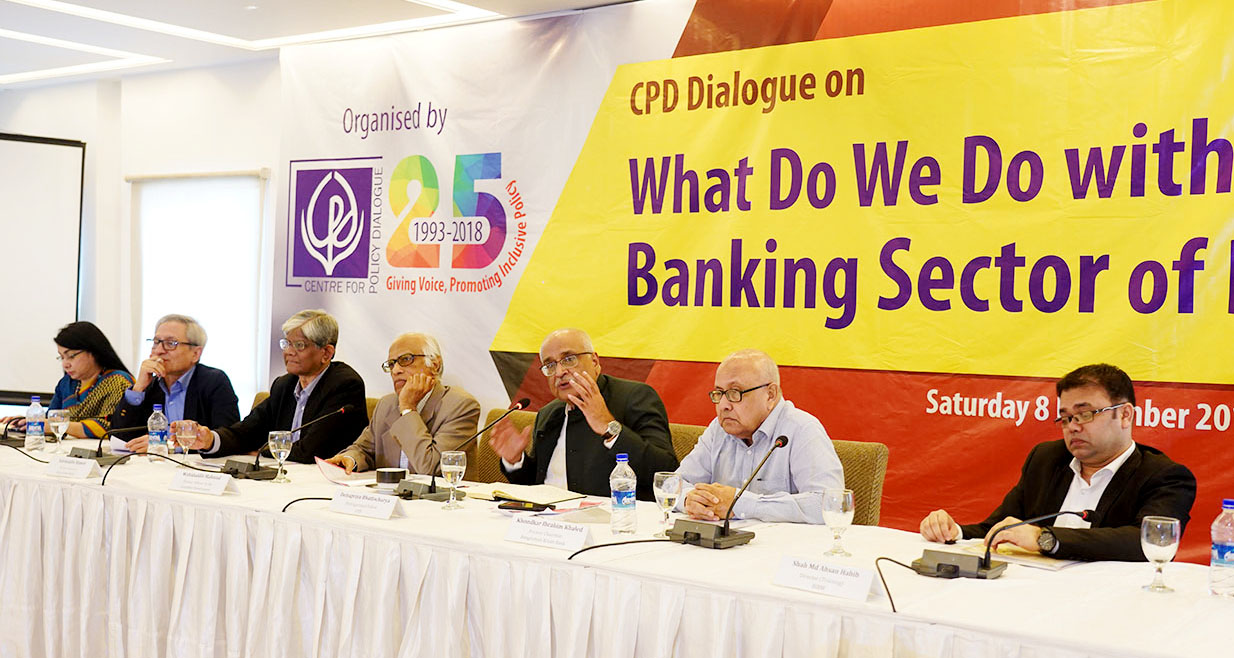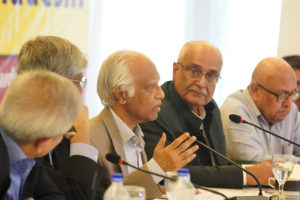
The banking sector in Bangladesh is undergoing a serious crack caused by unwanted political intervention among others. Therefore, the country is in a dire need of ending the political intervention as an immediate step, for which commitment should be marked in the election manifestos of political parties. Besides, the Central Bank needs to boldly exercise its autonomy in regulating the banking sector.
These are the core opinion generated from a CPD dialogue, “What Do We with the Banking Sector of Bangladesh?”, on 8 December 2018 at Khazana Gardenia Banquet Hall, Dhaka. Professor Wahiduddin Mahmud, Former Advisor to the Caretaker Government was the Chief Guest at the dialogue. Dr Salehuddin Ahmed, Former Governor, Bangladesh Bank, as the Special Guest and Mr Khondkar Ibrahim Khaled, Former Chairman, Bangladesh Krishi Bank, as the Guest of Honour, were present at the event. Dr Zahid Hussain, Lead Economist, The World Bank, and Dr Shah Md Ahsan Habib, Director (Training), Bangladesh Institute of Bank Management (BIBM), offered their comments as Distinguished Discussant. Dr Debapriya Bhattacharya, Distinguished Fellow, CPD, chaired the session. Dr Fahmida Khatun, Executive Director, CPD, made the keynote presentation.
Dr Khatun presented the findings from a CPD research on the banking sector. The research analysed the problems in the banking sector and gave a set of recommendations to deal with the situation. The research shows that the cost of major banking scams sums up to BDT 22,502 crore, which is equivalent to 78.2% of the total cost for the Padma Multipurpose Bridge. Classified loan as a share of total loans was more than 10% for 9 banks during 2016-2018. Dr Khatun also highlighted the recommendation for an independent banking commission that CPD has been iterating for a long time and also to stop giving license to new banks.
“There is a nexus between the regulator, the bankers and the big borrowers and the results of this nexus could have been positive but rather we see unconditional recapitalisation. The recapitalisation was limited to state owned banks only but now it is getting into private banks indirectly”, said Dr Hussain while commenting as the Distinguished Discussant.
Mr Khaled opined that the regulators themselves are violating regulations and as a result, a group of people backed by unethical blessings from the regulators are misappropriating the system. He recommended Bangladesh Bank Governor to be recruited by the President upon suggested by the parliament who should be accountable to the parliament not the Ministry of Finance. Dr Ahmed felt that Bangladesh Bank has enough autonomy but one has to have the courage to make use of it.
Mr Tabith Mohammed Awal, Member of the Committee, MCCI and Deputy Chief Executive Officer, Multimode Group, emphasised on strengthening people’s voice against all the mishaps in the banking system and requested media to aid the voice. As a social measure, he suggested condemning defaulters through name and shame.

Professor Mahmud, the Chief Guest of the dialogue, alarmed that the mismanagement in the banking sector is giving a bad signal to the international community which is likely to negatively affect international trade of the country.
Dr Bhattacharya announced that CPD will form a Citizen’s Commission after the election to report on the state of the banking sector, identifying causes and remedies of the crisis. The report will be shared with the new government.
The floor comprising of bankers, development partners, academicians, economists, researchers, diplomats among others actively participated and shared their insights in the dialogue. Journalists from the digital and print media were also present at the event.


